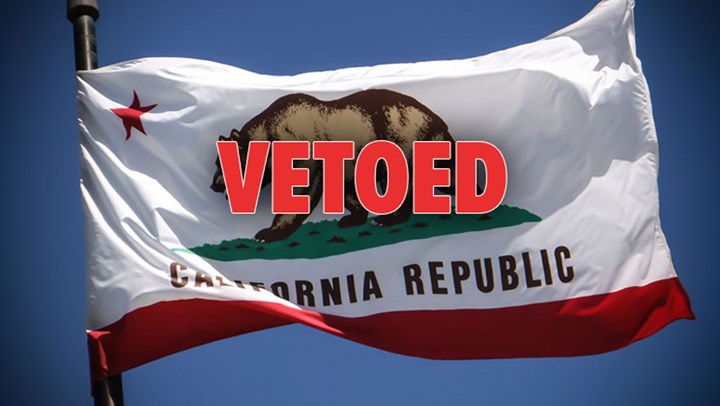
by Karen Mehall Phillips - Tuesday, October 2, 2018

In a refreshing move supporting the critical role of legal, regulated hunting over the emotion exploited by animal rights extremist groups, California Gov. Jerry Brown vetoed a bill late Monday that would have banned the importation and possession of certain African wildlife species statewide. Not only would Senate Bill 1487 have prevented California residents from bringing home their legally-hunted African game animals, but it would have set a dangerous precedent for extremist whose goal is not merely to shut down hunting in Africa but to ban it in every state, one small step at a time.
"Governor Brown stated he vetoed the bill because it is unenforceable," said Chris W. Cox, Executive Director of the National Rifle Association's Institute for Legislative Action. "Not only is it unenforceable, but this bill would have contributed to the demise of the very species it sought to protect. Lawful hunting funds counter-poaching efforts, feeds local communities and gives communities incentives to keep wildlife thriving. If we want to see wildlife in Africa outside of game parks, legal hunting must be not only allowed, but encouraged as a fundamental part of conservation."
Gov. Brown’s veto was an important derailment for California’s anti-hunting legislators who continue to push for more restrictions against law abiding sportsmen. This is one more reason NRA-ILA is so important to the collective hunting community's efforts to combat anti-hunting attacks. While it fights for hunters on the national and international levels, it also monitors proposed legislation against hunters and hunting at every state capitol through its NRA-ILA State and Local Affairs Division and through its office in Sacramento where a full-time staff of legislative advocates specifically focuses on the Golden State, so often at the epicenter of the anti-gun, anti-hunting movement.
For background on the bill, as NRAHLF.org reported in April, S.B. 1487 initially addressed the state’s public utilities code, but anti-hunting legislators amended it to create the Iconic African Species Protection Act. They went about picking and choosing African game species on the basis of popularity—not biological necessity—such as elephants, leopards and a handful of species not even listed on the Endangered Species Act’s (ESA) list of endangered or threatened species or on CITES (Convention on International Trade in Endangered Species of Wild Fauna and Flora). Why? Simply because the legislators knew that passage of such a bill would keep California hunters from hunting in Africa.
So on Apr. 19, NRA-ILA’s California State Director Daniel Reid sent a letter to the bill’s author opposing the bill. Reid wrote that the importation of legally-hunted wildlife from other countries was already regulated by the U.S. Fish and Wildlife Service under the ESA of 1973 and CITIES. CITES, by the way, ensures that international trade in wild animals and plants does not threaten their continued survival. As an active participant to CITES, the United States enforces the treaty by requiring permits for wildlife species entering the country.
The truth: S.B. 1487 ignored all of this. And in doing so, it clearly and gave no thought about the various species’ conservation and the billions of dollars hunters funnel into their conservation. For more on this often forgotten little detail, read “Hunters Contribute $426 Million to African Economy” and my recent article “How Do You Spell Conservation? H-U-N-T-E-R.”
Timing Is Everything
Gov. Brown’s veto comes at a time when his state’s political environment is more and more hostile toward hunters and gun owners in general. That makes his decision to protect the future of hunters and hunting that much more important as NRA-ILA, the NRA Hunters’ Leadership Forum and like-minded hunter-backed organizations unite to protect hunting’s future.
Preventing the passage of laws that are detrimental to hunting and wildlife conservation is the goal of every like-minded group across America that is concerned with protecting wildlife species into the future. This is why the NRA, SCI and other partner organizations work so closely with the Department of the Interior’s (DOI) U.S. Fish and Wildlife Service. This also is why NRA-ILA Director of Hunting Policy Erica Rhoad recently was selected by DOI Secretary Ryan Zinke to serve on his International Wildlife and Conservation Council. The council, which met again just last week, advises Secretary Zinke on international conservation issues. It is tasked with helping to increase public awareness domestically regarding conservation, wildlife law enforcement and the tremendous economic benefits resulting from U.S. sportsmen traveling abroad to hunt.
E-mail your comments/questions about this site to:
[email protected]
